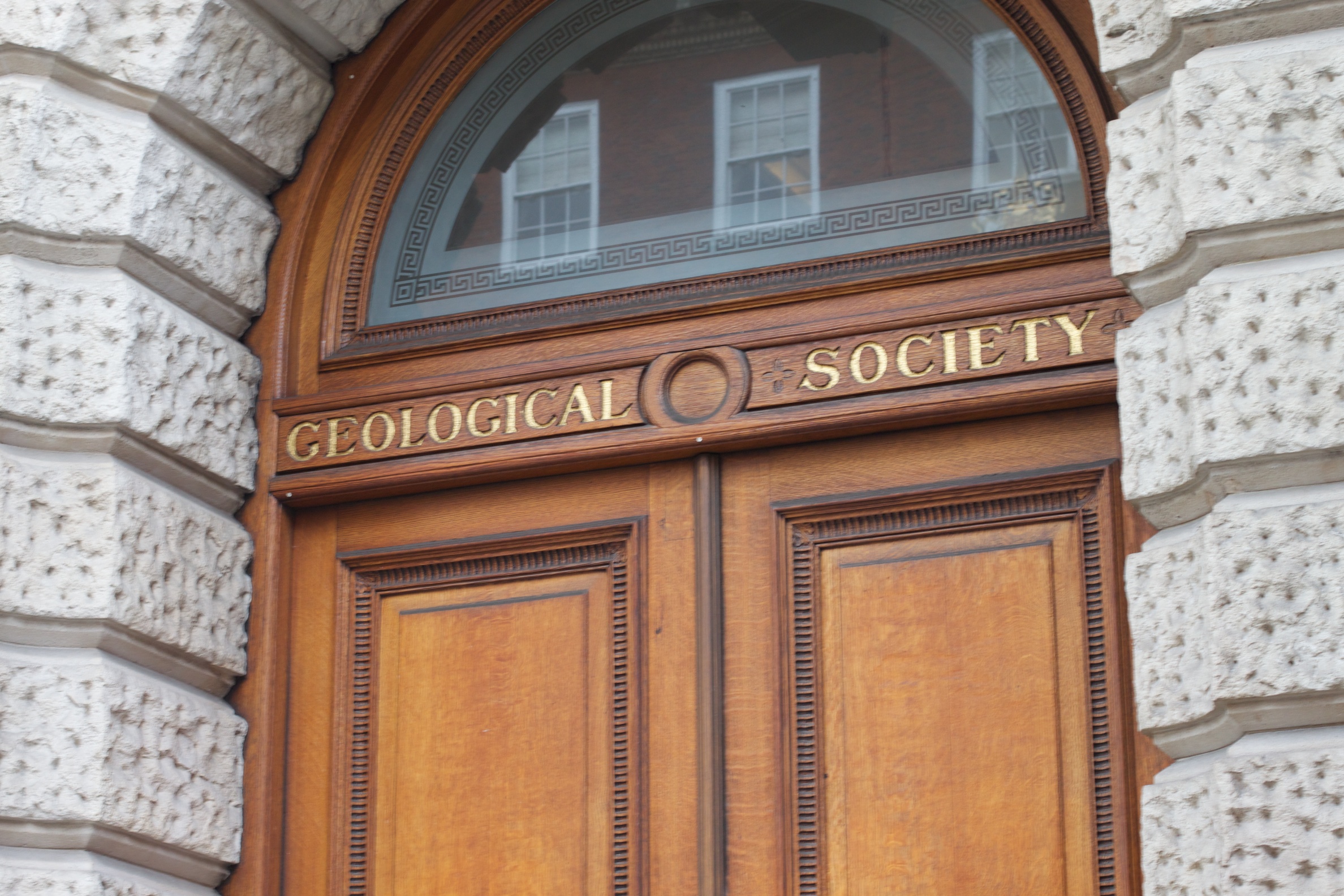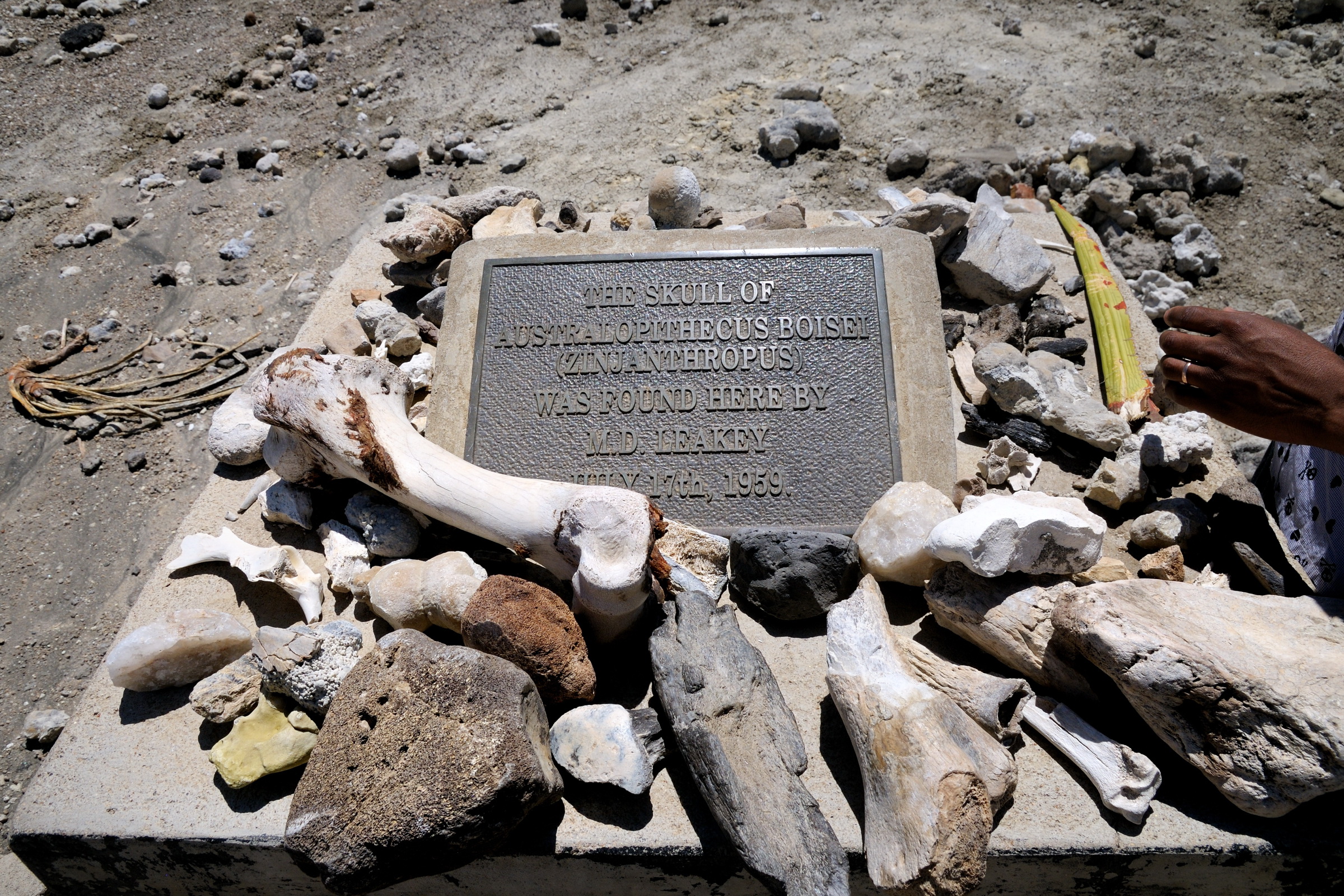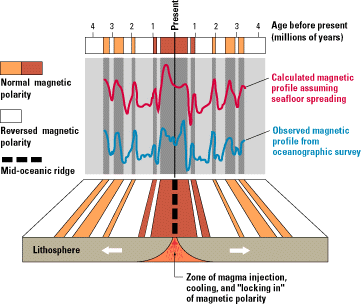|
Prestwich Medal
The Prestwich Medal is a medal of the Geological Society of London established in the will of Joseph Prestwich "to apply the accumulated annual proceeds...at the end of every three years, in providing a Gold Medal to the value of Twenty Pounds which, with the remainder of the proceeds is to be awarded... to the person or persons either male or female, and either resident in England or abroad, who shall have done well for the advancement of the Science of Geology; or, from time to time to accumulate the annual proceeds for a period not exceeding six years, and apply the said accumulated annual proceeds to some object of special research bearing on Stratigraphical or Physical Geology, to be carried out by one single individual or by a Committee; or, failing these objects, to accumulate the annual proceeds for either three or six years and devote such proceeds to such special purposes as may be decided". The money has also been used for funding publication and a library extension. Pr ... [...More Info...] [...Related Items...] OR: [Wikipedia] [Google] [Baidu] |
Geological Society Of London
The Geological Society of London, known commonly as the Geological Society, is a learned society based in the United Kingdom. It is the oldest national geological society in the world and the largest in Europe, with more than 12,000 Fellows. Fellows are entitled to the postnominal FGS (Fellow of the Geological Society), over 2,000 of whom are Chartered Geologists (CGeol). The Society is a registered charity, no. 210161. It is also a member of the Science Council, and is licensed to award Chartered Scientist to qualifying members. The mission of the society is: "Making geologists acquainted with each other, stimulating their zeal, inducing them to adopt one nomenclature, facilitating the communication of new facts and ascertaining what is known in their science and what remains to be discovered". History The Society was founded on 13 November 1807 at the Freemasons' Tavern, Great Queen Street, in the Covent Garden district of London. It was partly the outcome of a previou ... [...More Info...] [...Related Items...] OR: [Wikipedia] [Google] [Baidu] |
Mary Leakey
Mary Douglas Leakey, Fellow of the British Academy, FBA (née Nicol, 6 February 1913 – 9 December 1996) was a British paleoanthropologist who discovered the first fossilised ''Proconsul (mammal), Proconsul'' skull, an extinct ape which is now believed to be ancestral to humans. She also discovered the robust ''Zinjanthropus'' skull at Olduvai Gorge in Tanzania, eastern Africa. For much of her career she worked with her husband, Louis Leakey, at Olduvai Gorge, where they uncovered fossils of ancient hominines and the earliest hominins, as well as the stone tools produced by the latter group. Mary Leakey developed a system for Taxonomy, classifying the stone tools found at Olduvai. She discovered the Laetoli footprints, and at the Laetoli site she discovered hominin fossils that were more than 3.75 million years old. During her career, Leakey discovered fifteen new species of animal. She also brought about the naming of a new genus. In 1972, after the death of her husband, Leake ... [...More Info...] [...Related Items...] OR: [Wikipedia] [Google] [Baidu] |
Frederick Vine
Frederick John Vine FRS (17 June 1939 – 21 June 2024) was an English marine geologist and geophysicist. He made key contributions to the theory of plate tectonics, helping to show that the seafloor spreads from mid-ocean ridges with a symmetrical pattern of magnetic reversals in the basalt rocks on either side. Early life Vine was born in Chiswick, London, and educated at Latymer Upper School and St John's College, Cambridge where he studied Natural Sciences (BA, 1962) and marine geophysics (PhD, 1965). He married Susan 'Sue' Vine (née McCall), who worked as a research assistant for Drummond Matthews in the Department of Geodesy and Geophysics, University of Cambridge, contributing to the development of the sea-floor spreading hypothesis associated with Matthews and her husband. Plate tectonics Vine's PhD thesis was on 'Magnetism in the Seafloor' and supervised by Drummond Matthews. Having met Harry Hess he was aware of sea floor spreading, where the ocean bed acts ... [...More Info...] [...Related Items...] OR: [Wikipedia] [Google] [Baidu] |
Russell Coope
Russell Coope, also Geoffrey Russell Coope and G. Russell Coope (1930 Cheshire, UK – 2011) was a Quaternary paleoentomologist and neontologist and a paleoclimatologist specializing in the British Pleistocene. He was an expert and leader in the reconstruction of Quaternary paleoenvironmental conditions from fossil beetles. The relatively young age of his fossils allowed Coope to explore construction sites for fossils, in addition to geological field sites. Coope was an Honorary Professor of Quaternary Science and staff member at the University of Birmingham from 1955 to 1993. After retiring he continued working in his home laboratory and at Royal Holloway, University of London. Coope turned to beetles as a researcher subject while searching for fossil corals in Pleistocene sediments revealed in a sand quarry being worked in the Chelford Sands. Many of the beetles he found were from sites around Upton Warren in Worcestershire, and he used these to show that past climate change ... [...More Info...] [...Related Items...] OR: [Wikipedia] [Google] [Baidu] |
Adrian William Amsler Rushton
Adrian is a form of the Latin given name Adrianus or Hadrianus. Its ultimate origin is most likely via the former river Adria from the Venetic and Illyrian word ''adur'', meaning "sea" or "water". The Adria was until the 8th century BC the main channel of the Po River into the Adriatic Sea but ceased to exist before the 1st century BC. Hecataeus of Miletus (c.550 – c.476 BC) asserted that both the Etruscan harbor city of Adria and the Adriatic Sea had been named after it. Emperor Hadrian's family was named after the city or region of Adria/Hadria, now Atri, in Picenum, which most likely started as an Etruscan or Greek colony of the older harbor city of the same name. Several saints and six popes have borne this name, including the only English pope, Adrian IV, and the only Dutch pope, Adrian VI. As an English name, it has been in use since the Middle Ages. Religion * Pope Adrian I (c. 700–795) * Pope Adrian II (c. 792–872) * Pope Adrian III (c. 830–885) * Pope Adrian I ... [...More Info...] [...Related Items...] OR: [Wikipedia] [Google] [Baidu] |
Claude Jaupart
Claude Jaupart (born 22 May 1953) is a French geophysicist and a member of the French Academy of Sciences (since December 2008). Biography Professor of geophysics at the University of Paris-Diderot, and a researcher in physical volcanology, he is one of the world's leading specialists in natural hazards of geological origin. He was appointed a member of the Institute, French Academy of Sciences, Section of Universe Sciences. By a presidential decree of 12 January 2011, he succeeded Vincent Courtillot as head of the Institute of Earth Physics in Paris. Claude Jaupart's work focuses on the thermal structure of continents, the characteristics of the internal movements of our planet responsible for continental drift and the modalities of volcanic eruptions. Prizes and awards Prizes * 1993: Wager Medal from the International Association of Volcanology and Chemistry of the Earth's Interior (IAVCEI) * 1995: Silver medal from the CNRS, Fernand Holweck Prize from the French Academy ... [...More Info...] [...Related Items...] OR: [Wikipedia] [Google] [Baidu] |
Mary Fowler (geologist)
Christine Mary Rutherford Fowler, (born 1950) is a British geophysicist and academic. From 2012 to 2020, she served as the Master of Darwin College, Cambridge. She was previously a lecturer at Royal Holloway, University of London, rising to become Dean of its Faculty of Science. Early life and education Fowler was born in 1950 to Rosemary and Peter Fowler. She comes from a family of eminent scientists. A great-grandfather was Ernest Rutherford, the 'father of nuclear physics', her grandfather, Rutherford's son-in-law, was the mathematical physicist Ralph H. Fowler, and her mother Rosemary discovered the kaon, or K meson particle, in 1948. She studied mathematics at Girton College, Cambridge, graduating with a first class Bachelor of Arts (BA) degree in 1972. In 1972 she joined Darwin College, Cambridge to undertake post-graduate studies in geophysics, completing her Doctor of Philosophy (PhD) degree in 1976. Her doctoral thesis was titled "Seismic Studies of the Mid-Atlantic ... [...More Info...] [...Related Items...] OR: [Wikipedia] [Google] [Baidu] |
Henry Elderfield
Professor Henry "Harry" Elderfield One or more of the preceding sentences incorporates text from the royalsociety.org website where: (25 April 1943 – 19 April 2016), was Professor of Ocean Chemistry and Palaeochemistry at the Godwin Laboratory in the Department of Earth Sciences at the University of Cambridge. He made his name in ocean chemistry and palaeochemistry, using trace metals and isotopes in biogenic carbonate as palaeochemical tracers, and studying the chemistry of modern and ancient oceans - especially those of the glacial epoch and the Cenozoic. Early life and education Elderfield was born in Lazenby, North Yorkshire; a twin brother to John Elderfield. His father had been reported 'missing in action', shortly before he was born. Elderfield received his education from Eston Grammar School. He attended the University of Liverpool obtaining a Bachelor of Science degree in chemistry (oceanography) in 1965. He worked as a research fellow in the Geology Department, ... [...More Info...] [...Related Items...] OR: [Wikipedia] [Google] [Baidu] |
William James Kennedy
William James "Jim" Kennedy is a British geologist. Jim Kennedy studied at the University of London. Kennedy was a Fellow of Wolfson College, Oxford and Professor of Earth Sciences at the University of Oxford. He was curator of the Geological Collections at the Oxford University Museum of Natural History. Kennedy was awarded the Prestwich Medal by the Geological Society of London in 1990, the Neville George Medal of the Geological Society of Glasgow in 1992 and the Gold Medal for Zoology of the Linnean Society in 2002, and is the first recipient of the Palaeontographical Medal awarded by the Palaeontographical Society in 2014. He was the Acting President of Wolfson College during 1993–94 between more permanent presidents at the college. On 1 October 2003, Kennedy was appointed the Director of the Oxford University Museum of Natural History. [...More Info...] [...Related Items...] OR: [Wikipedia] [Google] [Baidu] |
Claud William Wright
Claud William Wright CB FGS (9 January 1917, Ellenborough, Yorkshire, England – 15 February 2010, Burford, Oxfordshire, England), Aka Willy Wright, was a senior British civil servant who was also an expert in the disciplines of geology, palaeontology, and archaeology. Life He was educated at Charterhouse and Christ Church, Oxford. At Oxford, he was influenced by the geologist W. J. Arkell, an interest that became a serious hobby. His professional career was in the War Office/Ministry of Defence, where he reached the rank of Deputy Secretary. In 1971, he transferred to the Ministry of Education and there was involved with the establishment of the first Ministry of Arts. In these posts, he worked directly with Margaret Thatcher and Lord Eccles. It was in Wright's hobbies where he made his greatest mark. Whilst working as a civil servant he was, between 1956 and 1958, President of the Geologists' Association, but after he "retired" in 1976 he could devote his time to h ... [...More Info...] [...Related Items...] OR: [Wikipedia] [Google] [Baidu] |
Charles Downie
Charles is a masculine given name predominantly found in English and French speaking countries. It is from the French form ''Charles'' of the Proto-Germanic name (in runic alphabet) or ''*karilaz'' (in Latin alphabet), whose meaning was "free man". The Old English descendant of this word was '' Ċearl'' or ''Ċeorl'', as the name of King Cearl of Mercia, that disappeared after the Norman conquest of England. The name was notably borne by Charlemagne (Charles the Great), and was at the time Latinized as ''Karolus'' (as in ''Vita Karoli Magni''), later also as '' Carolus''. Etymology The name's etymology is a Common Germanic noun ''*karilaz'' meaning "free man", which survives in English as churl (James (< Latin ''-us'', see Spanish/ Portuguese ''Carlos''). According to Julius Pokorny, the historical linguist and Indo-European studies, Indo-Europeanist, the root meaning of Charles is "old man", from Proto-Indo-European language, Indo-European *wikt:Appendix:Proto-Indo-E ... [...More Info...] [...Related Items...] OR: [Wikipedia] [Google] [Baidu] |
Harold Garnar Reading
Harold may refer to: People * Harold (given name), including a list of persons and fictional characters with the name * Harold (surname), surname in the English language * András Arató, known in meme culture as "Hide the Pain Harold" Arts and entertainment * ''Harold'' (film), a 2008 comedy film * ''Harold'', an 1876 poem by Alfred, Lord Tennyson * ''Harold, the Last of the Saxons'', an 1848 book by Edward Bulwer-Lytton, 1st Baron Lytton * ''Harold or the Norman Conquest'', an opera by Frederic Cowen * ''Harold'', an 1885 opera by Eduard Nápravník * Harold, a character from the cartoon ''The Grim Adventures of Billy & Mandy'' *Harold & Kumar, a US movie; Harold/Harry is the main actor in the show. Places ;In the United States * Alpine, Los Angeles County, California, an erstwhile settlement that was also known as Harold * Harold, Florida, an unincorporated community * Harold, Kentucky, an unincorporated community * Harold, Missouri, an unincorporated community ; ... [...More Info...] [...Related Items...] OR: [Wikipedia] [Google] [Baidu] |



